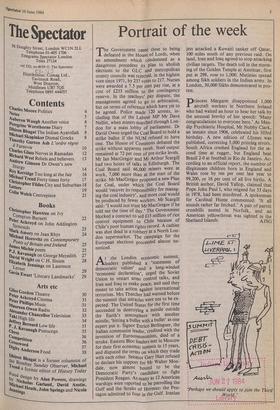Portrait of the week
The Government came close to being defeated in the House of Lords, when an amendment which condemned as a dangerous precedent its plan to abolish elections to the GLC and metropolitan county councils was rejected, in the highest vote since 1971, by 237 votes to 217. Nurses were awarded a 7.5 per cent pay rise, at a cost of £233 million to the contingency reserve. In the teachers' pay dispute, the management agreed to go to arbitration, but on terms of reference which have yet to be agreed. Police made 120 arrests, in- cluding that of the Labour MP Mr Dave Nellist, when miners marched through Lon- don for a mass lobby of parliament. Dr David Owen urged the Coal Board to hold a strike ballot if the NUM refused to have one. The House of Commons debated the strike without apparent result. Steel output remained at 72 per cent of pre-strike levels. Mr Ian MacGregor and Mr Arthur Scargill had two hours of talks in Edinburgh. The Coal Board said 46,000 miners were at work, 7,000 more than at the start of the strike. Mr MacGregor proposed a new Plan for Coal, under which the Coal Board would 'recover its responsibility for manag- ing the coal industry', and more coal would be produced by fewer workers. Mr Scargill said: 'I would not trust Mr MacGregor if he told me the time of day.' The Government blocked a contract to sell £15 million of riot control equipment to Chile because of Chile's poor human rights record. A cashier was shot dead in a robbery at a North Lon- don supermarket. The campaign for the European elections proceeded almost un- noticed.
AtA t the London economic summit, published a 'statement of democratic values' and a long-winded `economic declaration', urged the Soviet Union to restart arms control talks, and Iran and Iraq to make peace, and said they meant to take action against international terrorism. Mrs Thatcher had warned before the summit that miracles were not to be ex- pected. The United States for the first time succeeded in destroying a missile outside the Earth's atmosphere with another missile, 'hitting a bullet with a bullet' as one expert put it. Signor Enrico Berlinguer, the Italian communist leader, credited with the invention of Eurocommunism, died of a stroke. Eastern Bloc leaders met in Moscow for their first economic summit in 15 years, and disputed the terms on which they trade with each other. Senator Gary Hart refused to declare his support for Mr Walter Mon- dale, now almost bound to be the Democratic Party's candidate to fight President Reagan. As many as 12 American warships were reported to be patrolling the Gulf and the Straits of Hormuz: the Pen- tagon admitted to four in the Gulf. Iranian
jets attacked a Kuwaiti tanker off Qatar, 100 miles south of any previous raid. On land, Iran and Iraq agreed to stop attacking civilian targets. The death toll in the storm- ing of the Golden Temple at Amritsar, first put at 298, rose to 1,000. Mutinies spread among Sikh soldiers in the Indian army. In London, 30,000 Sikhs demonstrated in pro- test.
princess Margaret disappointed 1,000 aircraft workers in Northern Ireland who had waited an hour to hear her talk by the unusual brevity of her speech: 'Many congratulations to everyone here.' At Men- dip Psychiatric Hospital, Mr Nobby Clark, an inmate since 1906, celebrated his 103rd birthday. A new edition of Ulysses was published, correcting 5,000 printing errors. South Africa crushed England for the se- cond time at rugger, but England beat Brazil 2-0 at football in Rio de Janeiro. Ac- cording to an official report, the number of illegitimate children born in England and Wales rose by ten per cent last year to 99,200, or 16 per cent of all live births. A British author, David Yallop, claimed that Pope John Paul I, who reigned for 33 days in 1978, had been murdered. A spokesman for Cardinal Hume commented: 'It all sounds rather far fetched.' A pair of parrot crossbills nested in Norfolk, and an American yellowthroat was sighted in the Shetland Islands. AJSG `Perhaps we should apply to join the Third World.'












































 Previous page
Previous page